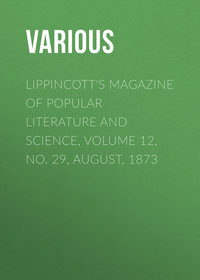Kitabı oku: «Lippincott's Magazine of Popular Literature and Science, Volume 12, No. 29, August, 1873», sayfa 16
The book is almost wholly free from that extravagance of expression and recklessness of all established codes of taste which have diverted attention from her purpose, and led to a false estimate of the character and tendency of her writings. It has none of the hindrances, for instance, which prevent many from seeing the magnificence of the conception in Folle-Farine. Its object is to enforce the lesson that the only true greatness is that which loses sight of self—that Love, and Love alone, is, both in its insight and its purpose, divine. "Love sees as God sees, and with infinite wisdom has infinite pardon." "Laughter and love are all that are really worth having in the world," but to gain them "one must seek them first for others, with a wish pure from the greed of self." "The world owes nothing to so personal a passion as ambition." "The first fruits of a man's genius are always pure of greed." What makes a great artist is the "vital, absolute absorption of personality in his love of art." The experience of the donzella (which constitutes what there is of the story), a nobler, and, we think, a truer, type of womanhood than Viva, yet with a like over-estimate of the advantages of wealth and position, brings her to the conviction that Pascarel is right. These truths, however, find their most effective illustration in the wealth of Italian tradition and history with which the pages abound. "Here is the secret of Florence, sublime aspiration—the aspiration which gave her citizens force to live in poverty and clothe themselves in simplicity, so as to give up their millions of florins to bequeath miracles in stone and metal and color to the future." "In her throes of agony she kept always within her that love of the ideal, impersonal, consecrate, void of greed, which is the purification of the individual life and the regeneration of the body politic." "Her great men drew their inspiration from the very air they breathed, and the men who knew they were not great had the patience and unselfishness to do their minor work for her zealously and perfectly." The workmen who chiseled the stones and the boys who ground the colors "did their part mightily and with reverence." The unrivaled works of art which are the true greatness of Italy owe their existence to the self-forgetfulness of their makers. So the love of Italy is in its essence a love for that which is best and noblest in human nature—"the consecration of self to an object higher than self." This love, however, to be true, must be more than perception or sentiment—it must bear fruit in likeness to that which it admires. "Each gift which men receive imposes a corresponding duty." "We are Italians," says Pascarel after recounting the glories of Italian achievement: "great as the heritage is, so great the duty likewise." As a companion-book of Italian travel, Pascarel has a special value, suffused as it is throughout with the blended charm of picturesque beauty and magical associations that belongs to the country and the people.
Books Received
The Great Events of History, from the Creation of Man till the Present Time. By William Francis Collier, LL.D., Trinity College, Dublin. Edited by an experienced American Teacher, New York: J.W. Schermerhorn & Co.
Words and their Uses, Past and Present: A Study of the English Language. By Richard Grant White. New edition, revised and corrected. New York: Sheldon & Co.
Manual of Land Surveying, with Tables. By David Murray, A.M., Ph.D., Professor of Mathematics in Rutgers College. New York: J.W. Schermerhorn & Co.
The Greatest Plague of Life; or, The Adventures of a Lady in Search of a Good Servant. Philadelphia: T.B. Peterson & Brothers.
Snatches of Song. By Jeanie Morison (Mrs. Campbell of Ballochyle). London: Longmans, Green & Co.
The Life and Times of Philip Schuyler. By Benson J. Lossing, LL.D. New York: Sheldon & Co.
Lewis Arundel: A Novel. By Frank E. Smedley. Philadelphia: T.B. Peterson & Brothers.
Our Forest Home. By the author of "Robert Joy's Victory." Illustrated. Boston: Henry Hoyt.
Philip Earnscliffe: A Novel. By Mrs. Annie Edwards. New York: Sheldon & Co.
Heart's Delight. By Mrs. Caroline E.K. Davis. Illustrated. Boston: Henry Hoyt. Henry Hoyt.
